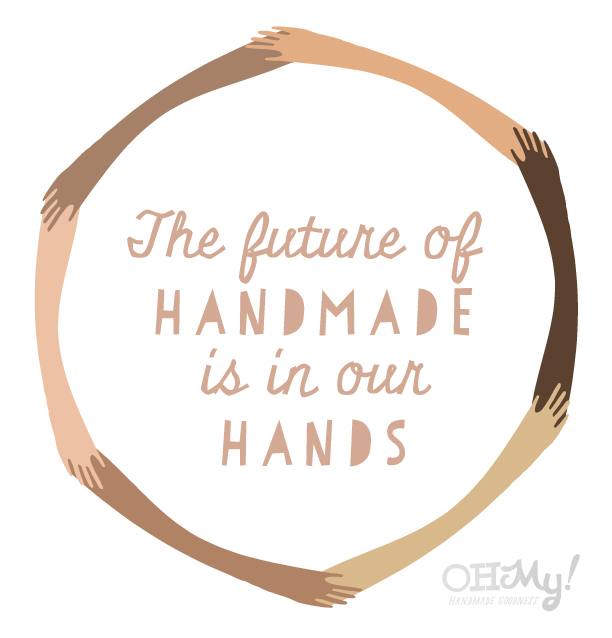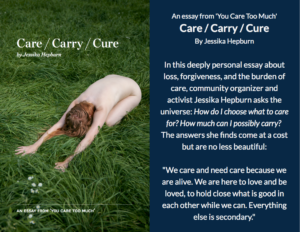

Did Etsy sell out? Is the DIY + handmade + maker movement over? What does handmade even mean anymore? How can makers protect the ethics of handmade as we scale?
I’ve been seeing a lot of discussion in the creative community on these questions and more sparked by the fall-out from Etsy changes to Seller Guidelines and the recent news that wholesale giant Cody Foster copied the work of Lisa Congdon followed by her call to action and viral rallying of the creative community. These two things collided in my mind yesterday when I read Abby Glassenberg’s post on “What Does Handmade Mean“. After our #OMHG chat today where so many creatives echoed the thoughts I’d been percolating on everything became super clear and connected.
First let’s take a look at the video Abby shared that made such an impression:
If the fundamental steps to make a stuffie like the one shown in the video-from design, to pattern-making, to production are essentially the same for a single crafter what makes Abby’s work anymore ‘handmade’ then what is done in a factory? If handmade was solely about the methods of production, the answer is nothing, everything made by human hands is essentially handmade. What differentiates Abby’s stuffed shark from the factory Neopets is story and community. Her stuffies have a story behind them while the product of faceless unknown workers does not.
After watching the video my first thoughts were: how many of those factory produced toys will end up in the garbage unloved? How many people ever acknowledge the complex and detailed work those factory employees do every single day? How much pride and joy do the workers get from their jobs-are they paid a living wage? Does the end product have value if it doesn’t contribute to people or place while also making a profit?
At the root of these questions is the ethics of consumption and the meaning of the objects we are filling our lives with. Of course we can make a bazillion things for pennies in an factory but do any of us need to consume those products? When I watched this video and then looked carefully at Abby’s work my first thought was that working in the factory was a pretty sucky job even if you are making a living wage but crafting toys using the same process at home or in a well run creative space is a dream job. The difference between buying the factory made object and Abby’s work is that when I consciously choose to buy something from her I directly influence her quality of life, I know whose mind imagined it, whose hands crafted all the fiddly bits and when it reaches me I know that she personally sent it, this power of connection transforms her stuffies from things to treasures. The whole reason I fell in love with the handmade movement was the chance to collectively craft an economy that put people and planet first while also allowing us to make a sustainable profit. The DIY movement was so closely aligned with this mission because it challenged us to not just passively consume things but to pick up tools and become empowered to create anything! Both movements were, and are, activism and art combined.
At the heart of what many of us have come to define as handmade is a belief in crafting, by hand, an ethical life invested with meaning. Whether that meaning is crafted through moving pixels on a screen to make art, publishing a heartfelt post, or sending off a package of handmade goodness-all of those creations tell a story and add value to the world. When we choose to purchase directly from a creative business whose story we connect with our purchase has a value beyond a financial transaction-we are actively choosing what kind of a world we want to live in. We are building a community.
Imagine a perfect world where before every purchase each of us made, from groceries to Christmas ornaments, we first asked: “Who made this? Does buying it contribute to my community? What is it’s story?”. Would we buy the deal on mass produced chemical saturated food or the box of low price knock-off ornaments? Or would we choose the smaller bag of locally grown apples and the single handmade treasure from an artist we love and connect with? And if we all made our purchases after asking those ethical questions would businesses like Cody Foster who seem to make good money mass producing the ideas of artists like Lisa Congdon be able to make a profit? I think not because all us consumers would be so busy buying awesome things directly from creatives and companies we trust unethical ones wouldn’t get traction. And if they did we would collectively call them out because we expect better. As West Elm showed when they pulled Cody Foster products today-our community is powerful and when we raise our voices collectively we change business for the better. As residents in the developed world with access to resources many can only dream of we are automatically in a position of power when we spend our money whether or not we choose to acknowledge it.
What does this have to do with Etsy’s changes to their Seller Guidelines and dropping “handmade” from their mission statement? Though these changes have been extensively covered online (check the source list below) I don’t see many asking why Etsy didn’t have their sellers vote on the changes or participate in public focus groups to better understand the impact of their decisions not just on individual sellers but on the handmade/DIY culture that raised them up. My biggest concern with the Etsy changes were perfectly outlined in this post by Ohhh Lulu, by allowing both manufacturing and drop shipping Etsy allows sellers to take the story and context out of their products. Now when you purchase there is no assurance that your items will have ever passed through the hands of the maker, just a series of faceless contributors…which starts to look a lot like the video above. Once you remove the story you loose the magic. Do I think that handmade is possible to create in a factory? Absolutely. Factory made does not need to be story or meaningless. Being able to scale is vital if we are actually going to follow through on the promise of a new economy, after all, we have to demonstrate that ethical consumption is viable for everyone.
I would love to see creatives growing their businesses with intention and a focus on the larger ethics. If you are going to outsource and scale do it responsibly and forge a connection with every link in your supply chain so that your end consumer understands the story of the piece and all the hands that played a role in creating. Make manufacturing connections that improve the quality of life of workers, invest your growth capital into other creative collectives and make awesomeness happen for our communities globally. That was the promise of the handmade movement from the very beginning. Some elements of the Etsy seller changes seem to show that they will focus on showing the stages of production and enforcing exactly this kind of transparency-but I worry about their eliminating handmade from their mission statement and what that means about their bottom line-is it just profit, or people and process too? As consumers and makers we have the power to make careful decisions about who and what we support-in the coming months and years small handmade artisans as well as ethically run companies will need our advocacy more then ever as we navigate the changing landscape of handmade. And if companies don’t listen we can make ourselves heard!
Over the years my definition of “handmade” has grown and evolved just as our OMHG community has become more diverse and inclusive. I no longer make handmade stuff for sale but what hasn’t changed is our handmade ethics and core belief that people matter, stories matter, places matter, process matters, creativity matters, doing good for our planet matters. I put my money and time where my heart is, investing it into the stories of makers and companies that are doing great work in the world. When I purchase anything I want to know who made it and why because I want to be part of the story and invest in a life of meaning for everyone. For many of us we make these choices because handmade isn’t a buzz word-it is a way of life, it is a philosophy, it is a whole world we are crafting together and based on our #OMHG chat today about what DIY means to us the maker movement isn’t over, we are just getting started!
Resources & further reading:
- http://lisacongdon.com/blog/2013/10/my-art-was-stolen-for-profit-and-how-you-can-help/
- http://jezebel.com/is-giant-folk-art-company-cody-foster-stealing-from-sma-1446015759
- http://shine.yahoo.com/work-money/were-ripping-off-indie-artists-cheap-tchotchke-habit-202500409.html
- http://www.flickr.com/photos/105498342@N02/
- West Elm pulled Cody Foster products! http://blog.westelm.com/2013/10/17/we-love-authenticity/
- http://www.artsyshark.com/2013/10/17/alleged-copyright-theft-goes-viral/
Etsy New Seller Guidelines
- http://www.etsy.com/new-guidelines
- http://www.wired.com/design/2012/09/etsy-goes-pro/
- http://www.ohhhlulu.com/2013/10/etsy-policy-updates-redefining-handmade.html
- http://www.whileshenaps.com/2013/10/etsy-redefines-handmade-authorship-responsibility-and-transparency.html
- http://www.entrepreneur.com/article/228682
- http://www.everythingetsy.com/2013/10/new-etsy-guidelines/
- http://www.businessweek.com/articles/2013-10-16/etsys-new-rules-open-doors-to-bigger-sellers
Add your links to stories and resources in the comments so we can all be informed, individually we might not have the answers but together we are a whole lot of solutions waiting to happen. Connect in the comments, in the member forums or on Twitter using the #OMHG hashtag to meet and discuss our thoughts about the future of the DIY/maker movement and the changing definition of handmade!


[…] about the direction of the handmade movement and copycats with this great article by Jessika at Oh My Handmade. Have you been following the awful story of how wholesale giant Cody Foster stole artist Lisa […]